Professor Guzman Carriquiry Lecour has served the Holy See for 43 years. He recently celebrated his 70th birthday (April 20, congratulations!). He is currently secretary of the Holy See’s Pontifical Commission for Latin America — the first layperson to serve in that role (since May 2011), just as he was the first ever layperson to be chosen undersecretary of a Vatican dicastery, the Pontifical Council for the Laity (since September 1991).
Born in Montevideo, Uruguay, Carriquiry earned degrees in law and social sciences, then headed Catholic university student groups both in his native country and at the Latin American level. During these pastoral activities, he worked closely both with Latin American bishops’ conferences and in preparation for papal visits to those countries.
He was also closely involved in organizing World Youth Days, as well as maintaining contact with a wide variety of lay groups in the Catholic world.
Among his numerous published works are A Wager for Latin America (Una apuesta por America Latina, Editorial Sudamerican, 2003) and The Bicentennial of the Independence of the Countries of Latin America: Yesterday and Today (El bicentenario de la Independencia de los Paises latino-americanos; ayer y hoy, Ediciones Encuentros, 2011) — both prefaced by Jorge Mario Bergoglio, then-Cardinal Archbishop of Buenos Aires, but whom Carriquiry had known ever since the current Pope was the provincial head of the Argentine Jesuits.
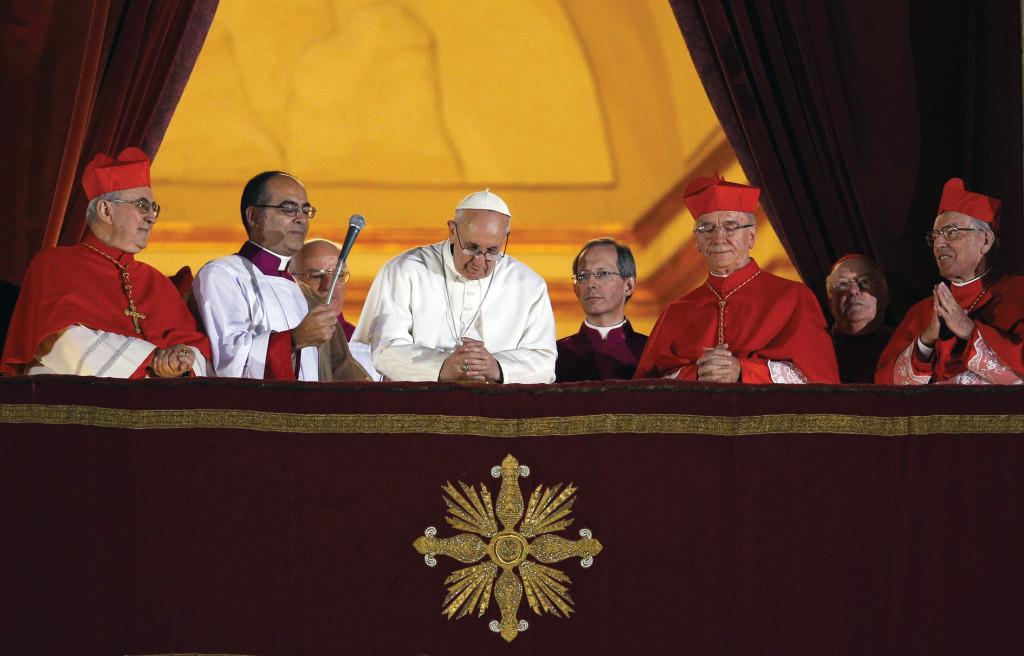
“Pray for me” were the first words Pope Francis spoke in public on the evening he was elected, March 13, 2013. This was his first significant action as Pope — to ask for prayers.
Professor Carriquiry, at the moment of Cardinal Jorge Mario Bergoglio’s election, what was your strongest feeling?
Guzman Carriquiry: I felt staggered by the novelty of what was occurring. We were caught up in the midst of two very new situations of far-reaching importance: Pope Benedict’s renunciation, and then the election of the first-ever Jesuit and Latin American Pope. It was staggering… two earthquakes! It’s no coincidence that Pope Francis states repeatedly that we need to be open and welcoming to God’s call to go beyond our “safe zones,” even in the ecclesiastical, pastoral, and spiritual senses.
You were witnessing the election of a cardinal you knew well, one who had written the preface to the original Spanish-language edition of your 2005 book, A Wager for Latin America, as well as for your more recent one, The Bicentennial of the Independence of the Countries of Latin America…
Carriquiry: For years I had had the spiritual certainty that Father Bergoglio was destined to become Pope… I knew him, and had associated with him for a long time, and this certainty was reconfirmed for me every time we met…
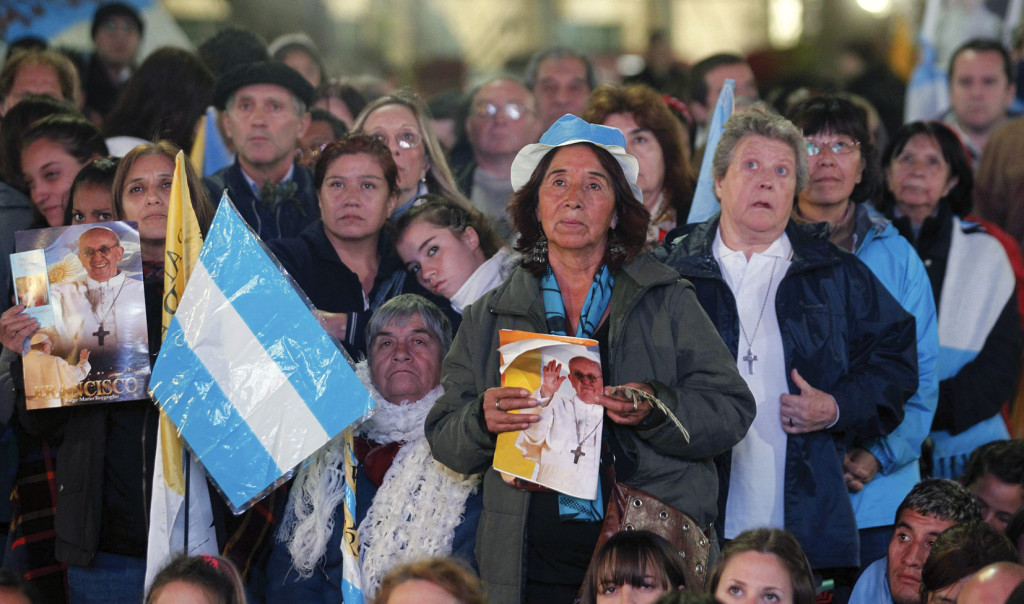
People hold Argentine flags and images of Pope Francis as they watch the televised broadcast of the inaugural Mass of the pontiff outside of the Metropolitan Cathedral in Buenos Aires, Argentina, March 19, 2013.
But in 2005 his candidacy had been proposed, as an alternative to Joseph Ratzinger’s, without success, even though he had had the support of about 40 cardinals…
Carriquiry: We all felt, in the long years of John Paul II’s illness, that Cardinal Ratzinger, given his extraordinary personality, would be the ideal candidate as a successor. I am sure that Cardinal Bergoglio also shared this conviction. I believe he was surprised to find himself a candidate, and that he himself thought that his time had not yet come. In any case, even Bergoglio himself never thought of his candidacy as an “alternative” one.
Now, a year later, is there still this sense of “surprise” for the “novelty”?
Carriquiry: God’s first surprise for us was the speed in passage: from the dramatic, tense and dark condition that the wise and saintly Pope Benedict XVI suffered through in that sort of Way of the Cross that was his papacy, to a condition of joy and hope stemming from Pope Francis’ first months. Right away, the Latin American Pope exercised a formidable attraction, not only for Catholics, not only for all Christians, but also in other religious circles, and for those even more distant: agnostics and even atheists.
How can this attraction be explained?
Carriquiry: Not entirely by the great communicative virtues of Pope Francis. There is something more. Maybe, after such a dramatic and tense situation, the people’s hearts yearned for something different, for serenity and joy. It is also true that, from the onset of his pontificate, Pope Francis has done everything possible to touch people’s hearts; this has occurred through the grace of God, and has been helped, too, by his previous pastoral experience. This attraction persists even now. It wasn’t a fleeting enthusiasm sparked by novelty, as many had thought. On the contrary: St. Peter’s Square at the Sunday Angelus and Wednesday general audience is as crowded now as ever. And polls in many countries confirm an extraordinary popularity, which in Latin America — understandably — is higher than 90%.
What kind of attraction is this?
Carriquiry: It is certainly a very complex phenomenon. Part of it is a superficial attraction, sometimes stoked by the mass media. Sometimes it is curiosity, often on the part of people who are far from the Church. Then there is the attraction that is breaking through prejudice and resistance. There are also those who are attracted because they can feel questions and expectations stirring up within them. For a great many, the attraction is tied to a new flourishing of their faith.
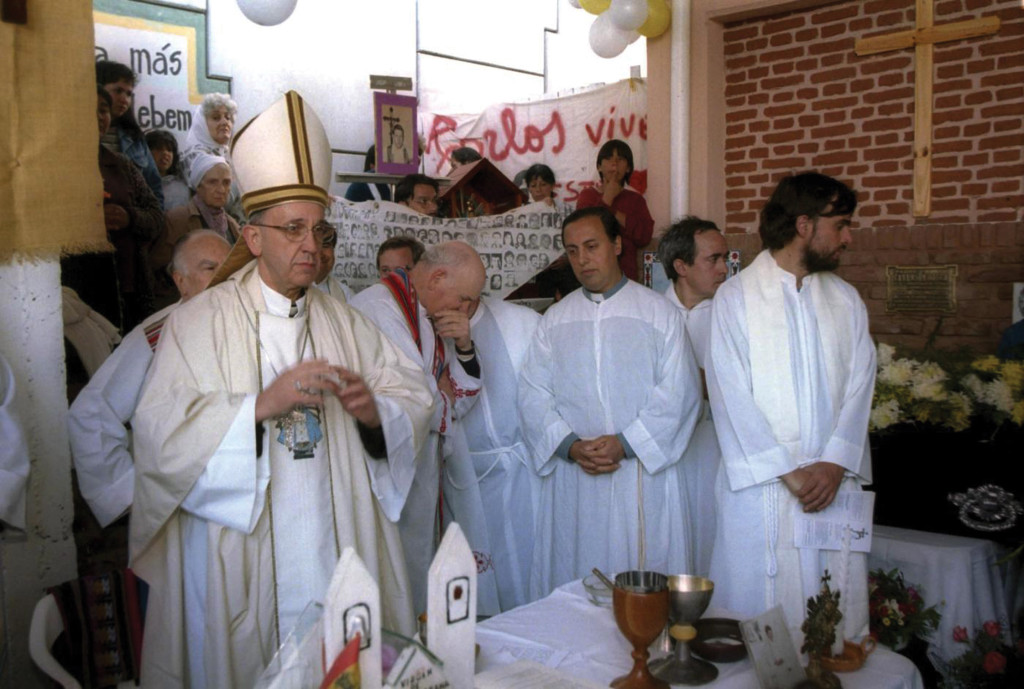
In this 2000 photo, Argentina’s Archbishop Jorge Mario Bergoglio, left, celebrates Mass in honor of slain priest Carlos Mugica on the day his remains were taken to the Villa 31 slum in Buenos Aires, Argentina.
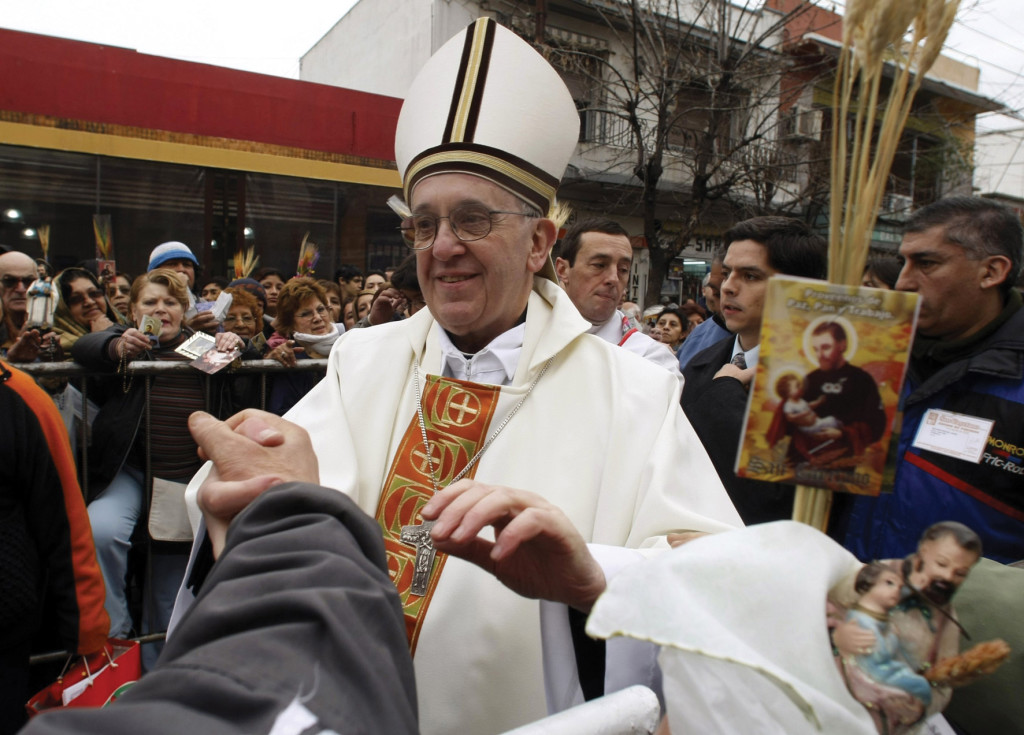
Bergoglio in a 2009 photo, in a procession for St. Cayetano, a Salesian.
What does it mean for the Church to have a Latin American Pope for the first time? What does it mean for Latin America? Has something basic changed?
Carriquiry: The change has been radical. A few years ago, for the first time in 500 years, we had a Pope coming from outside Italy, from semper fidelis Poland. After him, another non-Italian European, the greatest intellectual thinker of European humanistic culture, Cardinal Joseph Ratzinger. So first, the Pope as pilgrim among the nations, then the best representative of European Christian tradition. Now we have a Pope coming almost from the ends of the earth, from across the ocean.
Is this also the result of a geopolitical shift?
Carriquiry: Yes, it is. This election is, to a certain extent, a sign of Europe’s economic, political, and cultural decline and, to a lesser extent, its ecclesiastical one. It is unprecedented. For many centuries Europe was the cradle of development and spreading of the faith. Since 1945 Europe hasn’t been the center of the world, but for the Catholic Church it continued to be the most important continent. Vatican II — certainly a gift for the whole Church — was predominantly European in outlook, based on a renewal that started in the Benelux nations and swept down to northern and central Italy. The Latin American synods had made only a modest contribution to the Council’s documents: in fact, they became known to many, ironically, as “representatives of the Church of silence.” But afterwards, when it was time to put the Council’s teachings into practice, our Latin American Churches began walking an intense path, even a dramatic one, but one that was always seeking to reach a greater maturity and take on new responsibilities. This has meant the Universal Church’s becoming much more multi-polar.
Multi-polar… perhaps Rome isn’t considered the center anymore?
Carriquiry: No, Rome is always the center. The center is where Peter’s successor is. It was, and has always been, the center of the Church. However, as early as the 1970s, a great Brazilian Jesuit scholar, Henrique Claudio de LimaVaz, was already speaking about Churches that are fountains and Churches that are reflections. The European Church was a fountain up to our times, certainly up to the time of Vatican II. Our Latin American Churches have instead been reflections. Today we have started to be fountains. Ecclesiastical geopolitics is going through changes of an unpredictable nature.
Does Pope Bergoglio act as Cardinal Bergoglio did, or has he modified some of his behavior?
Carriquiry: Those who know him know that Pope Bergoglio, in his humanity, his interior spirituality, his pastoral outlook and his missionary passion is the same as Cardinal Archbishop Bergoglio always was. However, the grace that comes with a new position helps bring to the surface qualities that were already there. Jorge Mario Bergoglio, as Pope, is revitalized, rejuvenated. It is well-known that, as cardinal archbishop of Buenos Aires, he had been preparing to retire to a rest home for the clergy. Now, though, he has become much more lively and expressive in communicating what he feels. This was already noticeable when he went on pilgrimage to an Argentine sanctuary, or when he would throw himself into a popular saint’s day feast: he would go about hugging the poor and the humble. Now, this characteristic of his has blossomed into a great embrace towards the universal flock that has been entrusted to him. He has always been very free and very determined; he is continuing to be just that, in the Roman Curia.
What is his relationship with European rationalism, for example, 2 + 2 = 4?
Carriquiry: You Europeans have some strange pretenses, such as wanting to identify rationality with Europe. Who are all the others, then? Barbarians? For a long time, Europeans landing in Latin America would interpret it as the other prong of the dualism between civilization and barbarianism. Civilization meant Europe, and it was reflected in our larger, modernized cities; barbarianism was in our outskirts and countryside… Now, please: try and understand that Latin America is the West, it is part of the West along with Europe and North America… of course, it is a hybrid West, still developing toward modernity…
…and the Pope?
Carriquiry: He is a Jesuit, with the solid, deep, intellectual formation that the Society of Jesus develops in 14 long years of study. He was a professor of theology, literature, and psychology… He is a man with a solid cultural base, who favors simplicity as a way of reaching the heart of his people, in particular the poor and the small.
In that sense, what has Jorge Mario Bergoglio fundamentally adopted from Alberto Methol Ferré, the Uruguayan philosopher who passed away in 2009, and who was a friend of his and yours?
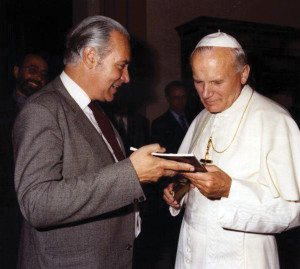
Alberto Methol Ferré, the Uruguayan philosopher who was close to St. John Paul II and also to Pope Francis.
Carriquiry: Methol Ferré was my teacher. I know, too, how first Father, and then Bishop, Archbishop, and Cardinal Bergoglio appreciated the writings of this “brilliant thinker of the Rio de la Plata,” as Bergoglio himself described him. In my opinion, Methol Ferré was the greatest Latin American lay Catholic intellectual of the second half of the 20th century and the beginning of the 21st. I know that the Pope has always had an enormous admiration for Methol Ferré, to the point that, at his recent meeting with Uruguayan President Mujica, who had mentioned the great philosopher, the Pope observed that “he helped us to think.” Methol Ferré helped my generation, and the previous generation — and I’d include Jorge Mario Bergoglio here — to be led more deeply into a Latin American historical consciousness, into the culture of Latin American peoples, and the cultural and historical originality symbolized in the shining, mestizo face of Our Lady of Guadalupe. He helped us understand it all more deeply, and to value our popular religious conscience as our way of absorbing the Gospel into our lives: this has given us a better understanding of the reality of Latin America today. Methol Ferré always reminds me of what Pope Ratzinger said at Aparecida: “God is the most real principle of all reality.” Methol applied this assertion as an interpretive principle when he spoke about the history of Latin America and its situation today.
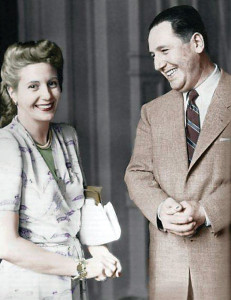
Argentine leader Juan Peron with his wife, Evita.
Peruvian scholar Marcelo Gullo wrote that Bergoglio needs to be placed “in the course of Latin American popular nationalism whose deepest roots can be found in the vision of Manuel Ugarte, José Vasconcelos, Juan Domingo Peron, and Alberto Methol Ferré.” We have already discussed Ferré. What about Peron? Can we say that he had influence on our new Pope?
Carriquiry: Peron? It would be very reductive to speak of a “Peronist” Pope! Never, never in his entire life did Jorge Mario Bergoglio declare himself to be a Peronist. We must understand, however, that Peronism, which pervaded Argentina from the 1930s through the 1950s and well beyond, was a national and popular phenomenon of such importance as to have profoundly shaped all Argentinians. In a way, they are all “Peronists,” even those who were against him…
Did they all breathe that same “descamisada” (literally, “shirtless,” meaning poor, ragged) air?
Carriquiry: Yes indeed, they did, and it certainly had nothing to do with Italian Fascism; it was strongly inspired by Christian humanism, by the social doctrine of the Church. Even I can say that I felt the effects of that great national and popular movement in Rio de la Plata. However, it would be wrong to place Bergoglio within political Peronism: it isn’t justifiable, and doesn’t reflect the way he has lived.
Professor Carriquiry, Father Antonio Spadaro, head of La Civiltà Cattolica, stated recently that this Pope “is opening construction sites, which he is not closing again” and that, for Bergoglio, “a Jesuit needs to be a person with an incomplete and open way of thinking, one who thinks while constantly looking towards the horizon, holding up Christ at the center of his thoughts…”
Carriquiry: …that’s a wonderful expression, by Father Spadaro…
Regarding this, there are those in the Catholic world who feel that opening those construction sites, without closing them up again, creates an insecurity of identity, in a world already characterized by the uprooting of peoples…
Carriquiry: Well, then, what do we want? A Church that closes itself off in an ecclesiastical, self-referential state? One that takes refuge in repeating its principles over and over, never coming into contact with the realities where evangelization is needed? The Gospel meditated and shared every day, catechesis on the Church’s sacraments, and Evangelii gaudium, the Apostolic Exhortation that traces everything back to the Church’s great tradition: are not all these enough to reaffirm our identity? The Pope is calling all of us to a personal, pastoral and missionary conversion. Conversion means changing our lives, looking at it afresh to cause it to conform to Christ’s presence, and also to re-examine the structures of the Church, to avoid her becoming fossilized through inertia, to figure out how these structures are serving God’s Reign. It is a missionary conversion: we need to go out, go out…meet the world head-on! Of course, this can make people quite dizzy, if they have been living too sedentary a life…
“Too sedentary a life”?
Carriquiry: Yes, too sedentary, or taking refuge in their “identity,” sheltered from the tempests of the world.
But they also have a desire to fight, hic et nunc, here and now…
Carriquiry: The fact is that many of them, many of us, often react as did the elder brother in the Parable of the Prodigal Son: “But how is it…. but I… I have always been right here.” This is a missionary Pope; he goes out to look for the 99 sheep that have fled, and thus he goes out, with his arms open wide towards those who are far-off, as Jesus does. And he rejoices over the sheep that returns, and he dedicates himself to it. This is the first question we have to ask, with this new Pope: “What is God telling us to change in our lives, through the ministry of Pope Francis?”
Another perplexity among many Catholics rests in Bergoglio not intervening punctually in matters of non-negotiable values. We all recognize that, in principle, he strongly reaffirms the value of life, the family founded on the union between one man and one woman, of an education based on the values of humanism, in which schools shouldn’t be reduced to re-education camps for one unique way of thinking… but many complain that when cases come up that are concrete, and abhorrent decisions are made — as has happened recently in several countries, mainly European — the Pope doesn’t say anything directly, and this implicitly discourages militant Catholics. Sometimes we can hear people saying that “Pope Wojtyla and Pope Ratzinger would have said something at the Sunday Angelus…”
Carriquiry: Every time we contrast different Popes, it is the work of the Evil One, who sows lies and division! If construction sites are open, it is due to a solid adhesion to the great tradition of the Catholic Church, of which this Pope is witness and minister. The Pope, these past months, has spoken out strongly in favor of these fundamental values, which are essential within the moral teaching of the Church. He prefers calling them “essential values” for reason and faith, and not “non-
negotiable values,” an expression that seems clear but which, in reality, is not quite so. When speaking to the diplomatic corps and to representatives of states, he has spoken of the “horror of abortion.” His press release after his meeting with Obama states that they discussed subjects such as the defense of life, conscientious objection, marriage and family… can we deny the concreteness of these subjects, or does anyone think that it was Obama who brought them up?
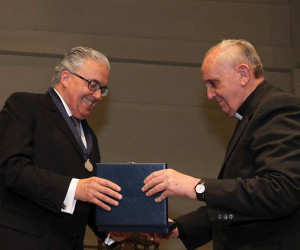
Guzman Carriquiry with then-Archbishop Jorge Mario Bergoglio, the future Pope Francis. Bergoglio wrote introductions for two of Carriquiry’s books.
Evidently not…
Carriquiry: The fact is, the Pope doesn’t want to be held hostage to constantly making specific statements on these values, because he would really need to be discussing them daily, in reference to all different countries. Italians, for example, would ask him to do it every time their legislature or higher courts made any kind of proposal. So would people from the United States, Argentina, France, and everywhere else. The Pope has already stated that he places his trust in national bishops’ conferences, that they might raise their prophetic voices against all the barbarian acts and for the defense of these fundamental values of civilization, which are not simply Christian values.
He himself has made clear that it wouldn’t be balanced for him to focus so much on these areas; in a way, we already have lived through a similar situation. The Pope wishes to emphasize with clarity the truth and the beauty of the centrality of the Annunciation…of what it is to be Christian in the true realization of the Incarnation, Death and Resurrection of Christ…
This was also the case in papacies before Bergoglio’s…
Carriquiry: Obviously! It has sometimes happened, however, that certain communities concentrate their attention, prioritizing it in perhaps an obsessive way, only on certain issues. This is understandable, because there had to be a reaction to counter the aggression against life, marriage and family. But in doing this, there was a risk of reducing Christian morals to a narrow sphere. I consider that the Pope wants, in a certain sense, to break this closed circle created by aggressions and reactions, nonetheless without renouncing the references to these values; on the contrary, he is trying to strengthen them, as has become clear in the past few months, and in particular the past few days. While our cultural and political battles are necessary to defend moral principles, and often we must fight tooth and nail, we must realize, as the Pope does, that ultimately it is God Who attracts people to Himself, and that evangelization stems from this attraction. We must also realize that these values appear more and more muddled within the reigning relativism of our times, and it is always more difficult to communicate how reasonable they are, without their basis in the Catholic Church.
The next two Synods, in 2014 and 2015, should serve to illustrate the situation and propose… who knows what! What will come out of all the discussions?
Carriquiry: It is true that we are already entering into the pre-Synod frame of mind. And certainly the participants will be pondering the matters you have brought up. All will be done within an atmosphere of the true, sincere and ample debate regarding marriage and family, as requested by the Pope himself, in his true construction site-opening style.


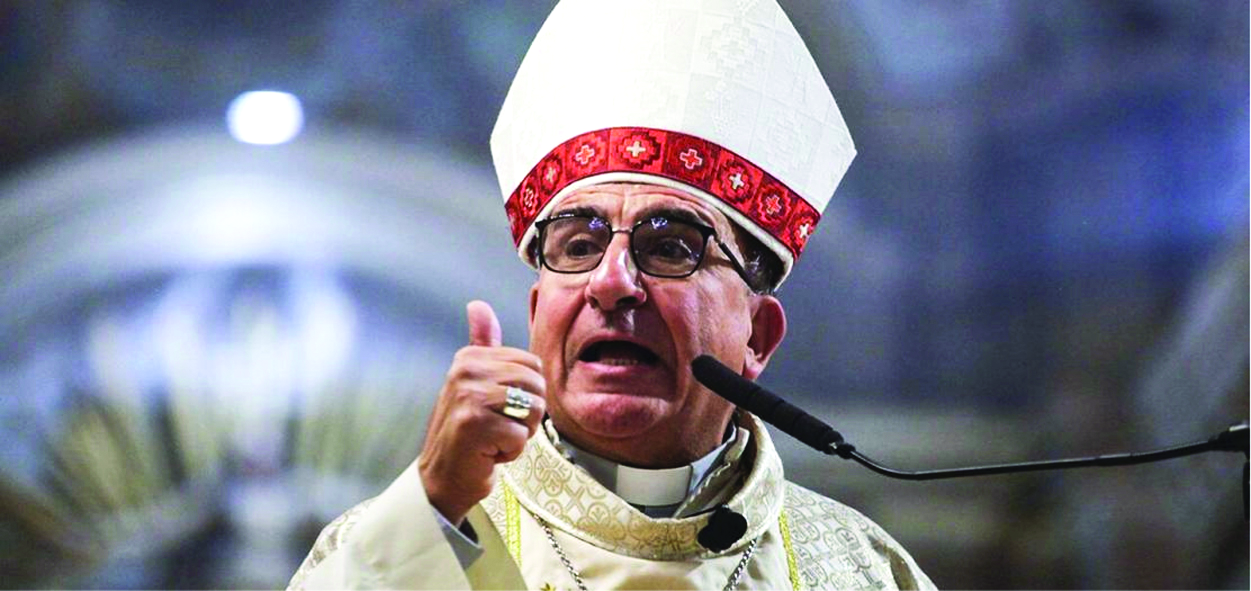
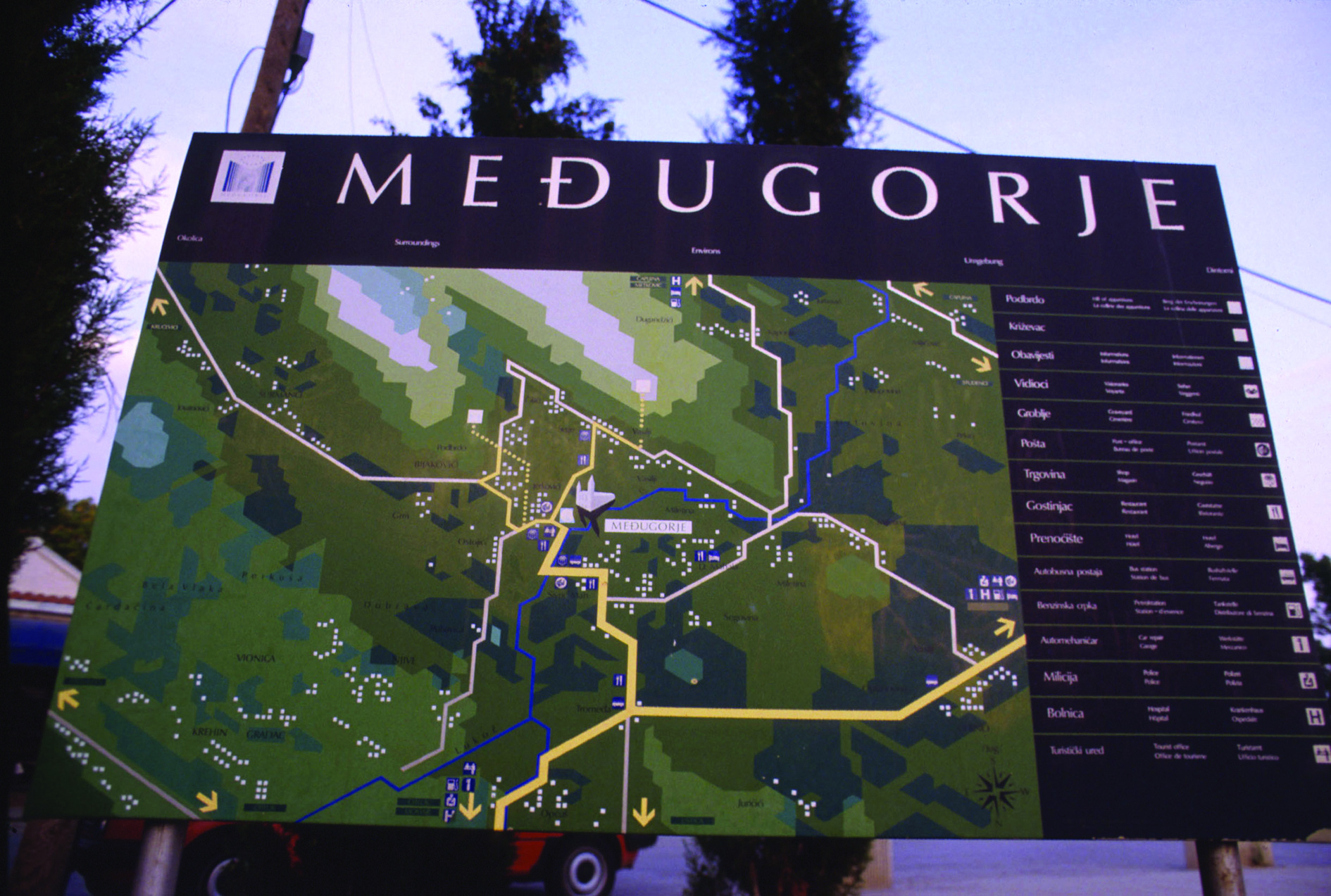
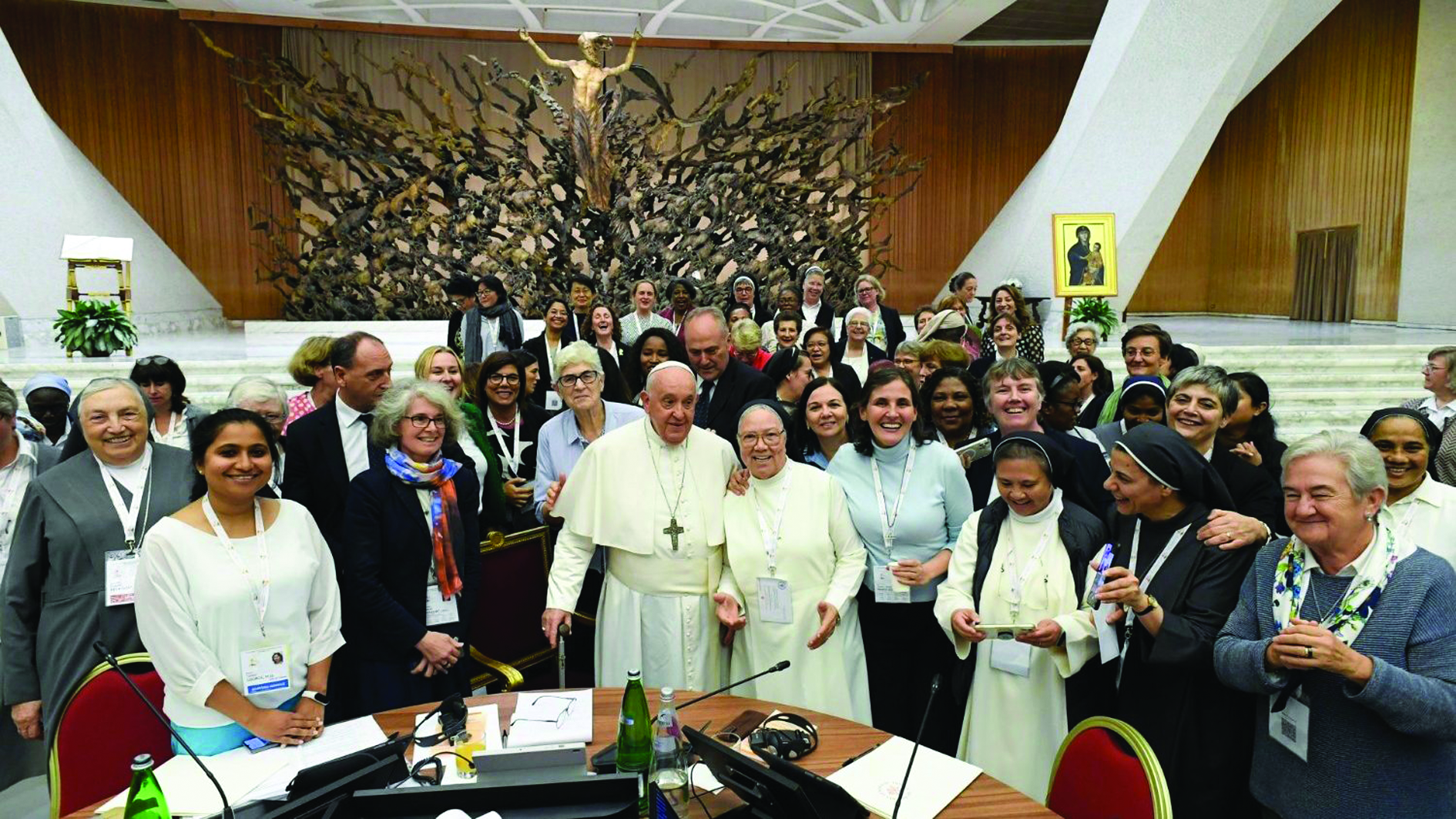

Facebook Comments